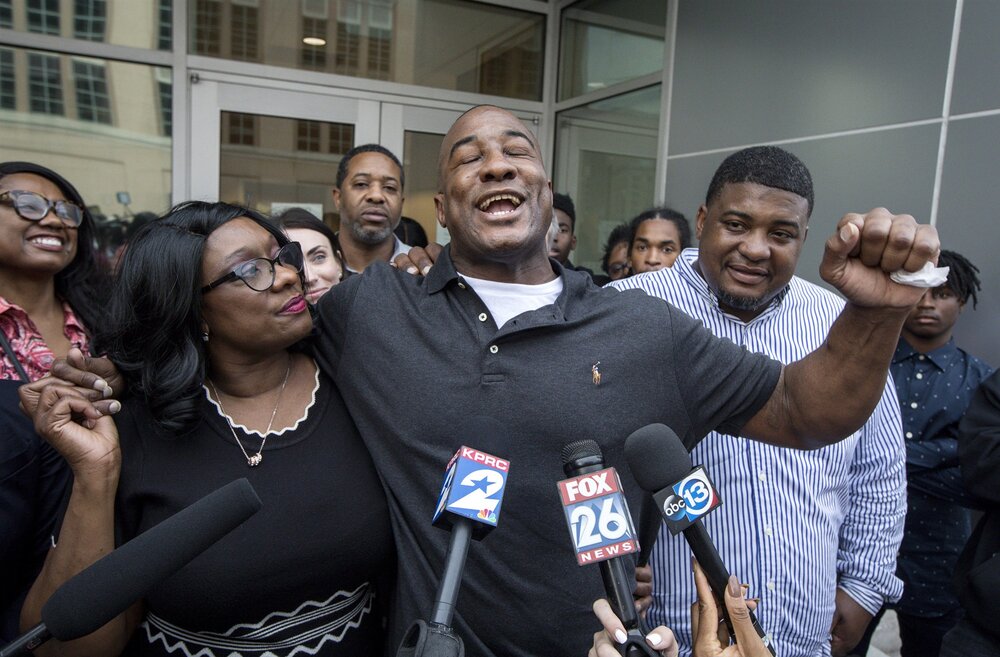The fastest-exonerated person in Texas history.
That was supposed to be Lydell Grant, according to a local TV report back in December, and according to just plain common sense.
The 43-year-old Houstonian was released in November after spending eight years of a life sentence locked up for a murder he did not commit.
His trial judge, George Powell, believes he’s innocent. Harris County District Attorney Kim Ogg believes he’s innocent. Houston Police Chief Art Acevedo believes he’s innocent.
Most importantly: science shows he’s innocent.
DNA evidence excluded Grant as the suspect and identified the alleged killer who has since been arrested, has confessed and, according to basic laws of inference, believes Grant is innocent as well.
That’s why Grant can be forgiven if he got his hopes up last week, thinking that perhaps, finally, eight months after his release, the state’s highest criminal court would get around to clearing his name.
He can also be forgiven for breaking down crying in his car on Wednesday when the court inexplicably declined.
Instead of issuing the awaited exoneration order, the Texas Court of Criminal Appeals directed the trial court to produce affidavits from witnesses regarding Grant’s claim of innocence. The court also sought photographs of the man who is now charged with the murder and tasked the trial court with concluding whether Grant is entitled to a new trial.
“Loss for words,” he told the editorial board moments after getting the news. “Don’t know what to say. It’s pitiful.”
We concur. It’s shameful treatment of a man who should have been freed from the cloud of suspicion many months ago and cleared to apply for $80,000 in state compensation for each year of his wrongful imprisonment.
Instead, he’s forced to languish in a legal purgatory while the black robes in Austin take their sweet time dotting I’s and crossing T’s. Grant remains a convicted murderer free on a $100,000 bond, required to do weekly checks with his bondsman, unable to land a job.
In an interview, Lydell put on a brave face, as seemed to be his nature, but his frustration and confusion were palpable.
“I didn’t do it. What else can I say? What else can I do?” he said. “I don’t know what’s next. Do I wonder if I’m going back to prison?”
He strained to understand how he can still be a suspect and why his DNA evidence isn’t the holy grail of innocence that it’s been in countless other cases.
“They are taking witnesses’ statements over scientific evidence,” Grant said. “When did they start doing that?”
Good question. The testimony of six eyewitnesses was key in Grant’s 2012 conviction in the death of Aaron Scheerhoorn, who was fatally stabbed outside a bar in Montrose in 2010. Mike Ware, head of the Innocence Project of Texas and Grant’s lawyer, said investigators used faulty identification measures that have since been changed by Texas law.
“Lydell should have been fully exonerated based on the DNA exclusion alone, just like hundreds of others,” Ware told the editorial board.
The court’s decision is particularly tone-deaf in the wake of mass protests calling for reforms to a justice system that unfairly targets Black men. While Black people make up 13 percent of the U.S. population, they represent 47 percent of known exonerations, according to the National Registry of Exonerations. On average, Black murder exonerees spend three years longer in prison before release than their white counterparts.
In the seven months since he was released, Grant has found strength in his family and tried to get on with his life. He enrolled in online classes at American InterContinental University for a two-year degree in business, on his way to a career as an audio engineer.
The trial court has up to 90 days to respond to the appellate court’s order, after which it could be seven more months before Grant hears from them again. Even if it takes longer than that, Grant said he didn’t give up during all those years in prison. He is not going to lose hope now.
“God did not bring me this far to leave me,” he said.
We wish we had similar faith in the Texas court system. The CCA’s lack of urgency in clearing Grant’s name, and its apparent minimizing of conclusive DNA evidence only deepen our doubts. Such cases, especially those where the inmate is still imprisoned, should be prioritized and expedited.
The state of Texas stole eight years of Lydell Grant’s life. What’s more worthy of the court’s time than righting that grievous injustice? Surely, the fine judges of the Texas Court of Criminal Appeals have nothing better to do.

